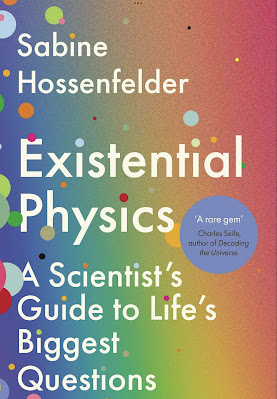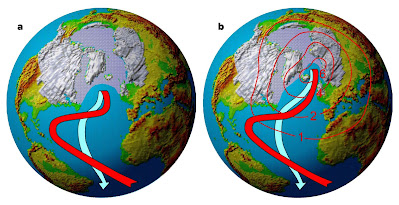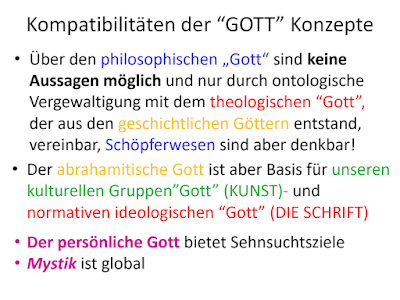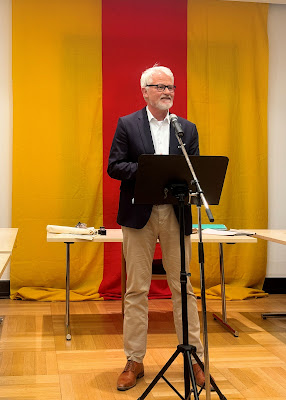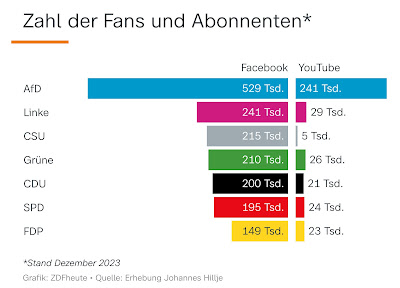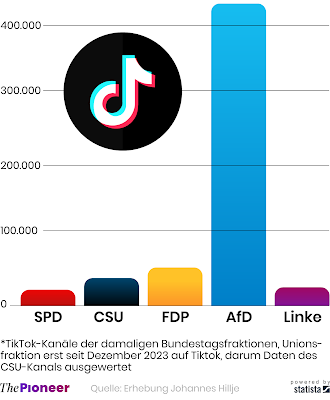This is the title of a book Sabine Hossenfelder published in 2022. Red Baron was made aware of it recently during a discussion at a Wikipedia Stammtisch.
I mentioned Sabine in an earlier blog as a great critic of present experimental high-energy physics. She expressed in more vital words than I ever dare use, namely that experiments at the Large Hadron Collider, the giant accelerator at CERN, did not reveal New Physics, are expensive, and should, therefore, be abandoned.
For a retired physicist, Sabine's latest book is not easy to read, but it addresses all of the topics at the forefront of present-day science.
One of her most important statements is that I want scientists to be mindful of the limits of their discipline. Sometimes, the only scientific answer we can give is "We don't know."*
*The many quotations from Sabine's book are in italics
Reading Existential Physics refreshed my knowledge of physics and was a step forward in my understanding.
Having read many physics books after my retirement, Sabine was the first to distinguish clearly between theory and hypothesis.
Mathematics is the tool to describe phenomena in physics.* The formulation of a physics law will not only describe the so-called initial state but also its development in the future. The key tool is differential equations with respect to time.
*Is mathematics just a tool for describing the world, or is it the world?
These equations also allow us to calculate backward, i.e., how a system developed. In particular, we may extrapolate from our present universe to its beginning, developing the theory of the Big Bang.
The further back in time we go, the more we generate models for our understanding, but these are modern creation myths written in the language of mathematics. All these hypotheses about the early universe (...) are pure speculation.

|
|
Rapid cooling of the universe and inflation with time. Note the question marks when approaching the Big Bang singularity. On the other end of the timescale is data from the James Web Space Telescope. |
The Standard Model
What can we rely on? Sabine states that The only fundamental theories we currently know of — the currently deepest level — are the standard model of particle physics and Einstein's general relativity, which describes gravitation. Red Baron has written about the standard model in the past.
The mathematical tool for subatomic systems is quantum mechanics, of which the eminent physicist Richard Feynman said:
However, Sabine thinks that much of the supposed weirdness of quantum mechanics just comes from forcing it into everyday language. She is very much a math person and personally doesn't see the need to translate math into everyday language. Once we have the mathematics, and at least someone understands it, it is often possible to communicate it verbally and visually.
Her remark coincides with my experience. Any panel discussion on any subject turns out to be too long* such that questions from the audience are eventually cut short.
*Some people like to listen to themselves, and others use the opportunity to start a whole new lecture.
The Standard Model of Big Bang Cosmology
While the standard model is complete (?), and physicists are desperately looking for New Physics, the situation at the other end of the spectrum doesn't look so bright.
The Lambda*-CDM (cold dark matter) model assumes that general relativity is the correct theory of gravity on cosmological scales. So, ΛCDM is the most accepted mathematical model of the Big Bang theory.
*The cosmological constant is denoted by lambda (Λ)

|
| ©Valerie Domcke (CERN) |
ΛCDM requires the introduction of dark matter, which helps, among other things, explain why galaxies rotate faster than expected. But that is not all. Astrophysicists also introduced dark energy to explain the accelerated instead of steady expansion of our universe. Dark matter and energy are huge and are no minor corrections.
Both hypothetical constituents of the universe are required to save Einsteins's theory of general relativity. However, neither has ever been directly observed; astrophysicists have merely indirectly inferred their presence from their gravitational effects.
Natural Constants
Red Baron hasn't counted them, but I confidently repeat what Sabine writes, The currently known laws of nature contain twenty-six constants. We can't calculate those constants; we just determine their values by measurement. The fine-structure constant (α) sets the strength of the electromagnetic force. Planck's constant (ħ) tells us when quantum mechanics becomes relevant. Newton's constant (G) quantifies the strength of gravity. The cosmological constant (Λ) determines the expansion rate of the universe. Then, there are the masses of the elementary particles.
Numerous calculations showed that slight variations in those universal constants would not allow life on planet Earth or could even make our universe collapse.
Did a god fine-tune these constants? Claiming that the constants of nature are fine-tuned for life is not a scientifically sound argument because it depends on arbitrary assumptions. While science does not rule out a creator or a multiverse, science does not require their existence either.
Sabine's conclusion: We have no reason to think the universe was made especially for us or for life in general.
String Theories
Richard Feynman's reaction while Sabine sees no strings attached to experimental results at the LHC.

|
| ©Sabine Hossenfelder |
Do multiverses with other possible combinations of constants exist? The multiverse hypothesis doesn't explain anything. A good scientific hypothesis is one that is useful for calculating the outcomes of measurements. We can't measure what we can't observe.
Free Will
Discussions about whether we have free will are endless. The final physics verdict is: According to the currently established laws of nature, the past determines the future, except for occasional quantum events that we cannot influence. Indeed, in Sabine's book, any argument in favor of free will is followed by this common thread.
She notes: Much of the debate about free will in the philosophical literature concerns not whether it exists in the first place but how it connects to moral responsibility.
She closes the chapter by declaring that she's a hard determinist and that we have no free will in the commonly accepted sense of "libertarian" free will. Whether you take that to mean that free will does not exist depends on your definition of free will.
The Principle of Least Action
Here comes something personal. Red Baron experienced the same eye-opener as Sabine: When, in the first semester of university physics, the principle of least action was introduced, it was a revelation: there was indeed a procedure to arrive at all those equations! Why hadn't anybody told me?
The principle of least action is also known as Fermat's principle, after Pierre de Fermat, who noticed that nature is minimalistic since a ray of light passes through a medium in a minimum amount of time.
Richard Feynman showed that the principle of least action is universal in physics since it applies to quantum mechanical systems, too. When a particle moves from point A to point B, all possible paths are taken into account, not, as in classical mechanics, only the path of the least action. However, the integral over all paths follows the principle of least action again.
Does the Universe Have Consciousness?
Sabine's answer is brief: If you want consciousness to be physical "stuff," then you'll have to explain how its physics works ... Going by the currently established laws of nature, the universe can't think, ending, You can't have your cake and eat it too.
Sabine limits herself to a few statements from people who would know about AI:
Elon Musk thinks it's the "biggest existential threat."
Stephen Hawking said it could "be the worst event in the history of our civilization."
Apple co-founder Steve Wozniak believes that AIs will "get rid of the slow humans to run companies more efficiently."
And Bill Gates, too, put himself in "the camp that is concerned about super intelligence."
In 2015, the Future of Life Institute formulated an open letter calling for caution and formulating a list of research priorities. It was signed by more than eight thousand people.
Is there a Purpose?
Sabine dares to criticize Stephen Hawking when he states that "there is no possibility of a creator." She points out that religion matters to many people in a way that science doesn't.
So she finds it likely that, in our ongoing process of knowledge discovery, religion, and science will continue to coexist for a very long time. That's because science itself is limited, and where science ends, we seek other modes of explanation.
Sabine insists that her book is about what we can know or not. I am saying that what's beyond what we can observe is purely a matter of belief. Science doesn't say anything about whether something exists or doesn't exist. Hence, claiming something exists is ascientific, and so is claiming it doesn't exist. If you want to talk about it, fine, but don't pretend it's science. Her argument closely follows that of Professor Urban.
The Benefits of Science
Scientists are often asked what the practical benefits of their research are. On the other hand, Sabine sees that science opens our eyes to possibilities we couldn't previously imagine, much less comprehend. Far from taking away wonder, science gives us more to marvel at. It expands our minds. She continues, saying that we have the desire to make sense of our own existence. We all have our own approach to sense making, and I have illustrated mine through the examples in this book.
Above all, my audience served as a constant reminder that knowledge matters, regardless of whether it has technological applications.
Conclusion
I share Sabine's feelings, which she expressed near the end of her book: I've spent most of this book discussing what physics teaches us about our own existence. I hope you've enjoyed the tour, but maybe you sometimes couldn't avoid the impression that this is heavy stuff that doesn't do much to solve problems in the real world.
Thank you, Sabine. You still got an old man excited.
